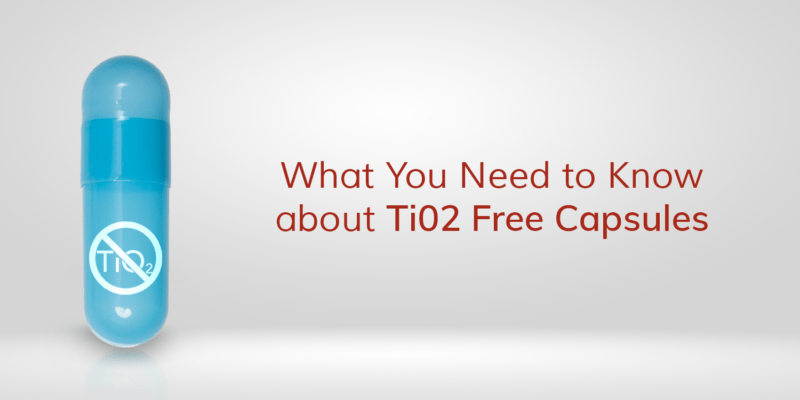What You Need to Know about TiO2-Free Capsules
Titanium dioxide (TiO2) has been such a ubiquitous ingredient in empty capsules that most makers of pharmaceuticals and nutraceuticals probably had not given it much thought… until now.
What changed? In January 2017, the National Institute of Agronomic Research in France published a study showing that ingestion of TiO2 may be harmful. Titanium dioxide is an inorganic compound formed when titanium, a natural metal element, reacts with oxygen in the air. Some researchers now believe that TiO2 nanoparticles may be able to pass through the protective walls of the liver, intestines, and lungs. This could lead to cellular inflammation phenomena, which in turn can lead to cancer.
TiO2 has been banned as a food additive in Europe
As a result of the French study, the European Food Safety Authority (EFSA) has classified TiO2—which is widely used as a white pigment and/or opacifier in many products—as an unsafe food additive. A complete ban on TiO2 as a food additive in food and food supplements went into effect in the EU on August 7, 2022.
This means that if you are selling nutraceuticals in the European Union, your product must now be free of TiO2. If you are selling pharmaceuticals in the EU, you have at least a three-year reprieve before this ban applies to your products as well.
The TiO2 ban, however, is not universal. Interestingly, not all government agencies view the data in the same light. In America, for example, the U.S. Food and Drug Administration (FDA) has determined that titanium dioxide does not pose a safety risk. So, if you are only selling into the U.S. market, the decision to switch to empty capsules that do not contain TiO2 would be based on market factors rather than regulatory requirements.
The TiO2 ban affects other oral dosage forms as well
Be aware that you cannot simply switch from capsules to tablets in order to comply with the TiO2 ban. Why not? First, of course, there may be relevant formulation and manufacturing issues that would rule out tablets for your products. Second, film coatings for tablets have included TiO2 for decades. While tablet manufacturers are now making TiO2-free film coatings available, these do not necessarily perform as well as the traditional film coatings.
High-quality TiO2-free empty capsules are available
The good news is that high-quality TiO2-free gelatin and HPMC empty capsules are both readily available. For example, brands that wish to switch to TiO2-free hard capsules can purchase the TiO2-free versions of CapsCanada’s G-CAPS® gelatin capsules or K-CAPS® HPMC capsules.
Eliminating titanium dioxide does not impact these capsules’ performance at all, either in general or on your filling machines. The dissolution profile, strength, stability, shelf life, ability to withstand variations in humidity, excellent separation, and closing properties, and outstanding capsule-to-tooling fit of G-CAPS® and K-CAPS® are not affected at all by the absence of TiO2. In short, even without TiO2, these are robust capsules with excellent machinability.
Eliminating TiO2 can impact opacity
There are many reasons why TiO2 has been so widely used in oral dosage formats. Titanium dioxide is an excellent opacifier, does not chemically react with other ingredients, does a great job of protecting the capsule’s fill from degradation by light, and can withstand both heat and light exposure. Needless to say, it is challenging to replace.
CapsCanada’s TiO2-free products use calcium carbonate as an opacifier. While CapsCanada’s white-colored gelatin and HPMC TiO2-free capsules rely on calcium carbonate for coloring, capsules with other colors can also be made using FDA-approved dyes that do not contain titanium dioxide.
However, none of these TiO2-free hard capsules are completely opaque. With the use of calcium carbonate instead of titanium dioxide, these capsules can best be described as semi-opaque. TiO2-free hard capsules provide light protection and masking of the capsule’s fill material. New formulations for TiO2-free hard capsules that will offer even greater opacity are in the pipeline.
A full range of colors is still available
Many pharmaceuticals and nutraceuticals rely on capsule color as part of their branding. You don’t need to lose this when you make the switch to TiO2-free empty capsules. The TiO2-free versions of both G-CAPS® and K-CAPS® are available in a full range of colors, including custom colors and Pantone color (i.e., PMS color) matching.
K-CAPS® HPMC capsules can also be made with natural colorants that are completely free of both TiO2 and calcium carbonate. These natural colorants include chlorophyll, spirulina, carmine, saffron, annatto, and vegetable carbon.
What the TiO2 ban means for the industry
Although different governments clearly have different opinions regarding the safety of titanium dioxide, from the consumer standpoint the trend is clearly moving towards clean labels. It seems that the EU’s TiO2 ban has simply brought a great deal of focused attention to this particular ingredient.
With an increasing number of consumers demanding “cleaner” products, and with investors scrutinizing companies’ sustainability efforts, switching to TiO2-free empty capsules may make good business sense even if you are not selling your products in Europe. Whether you’re looking to capitalize on market trends or simply get ahead of future regulations, now is the time to consider capsules that support your clean labels and sustainability initiatives—at a minimum for the new products in your pipeline.
By choosing the right hard capsule, you can also expand your product’s market appeal by meeting a variety of “free of” demands. For example, K-CAPS® made with natural colorants are free of titanium dioxide, calcium carbonate, synthetic dyes, starches, BSE, heavy metals, GMOs, and animal products. They are also vegan registered with the Vegan Society and both Kosher and Halal certified. In other words, an excellent choice for your clean label needs.



